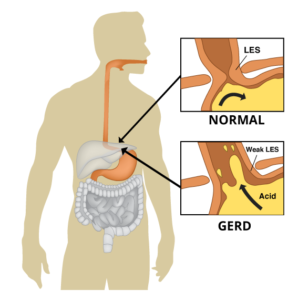Gastroesophageal Reflux (GERD)
Heartburn or acid reflux describes the condition when the sphincter muscle in between the esophagus and the stomach relaxes at the wrong time causing the acid from stomach contents to leak back into the esophagus. While occasional heartburn is not uncommon, Gastroesophageal reflux disease (GERD) results when heartburn or acid reflux occurs regularly.
Symptoms
People experience GERD in a variety of ways. Common symptoms include:
- burning sensation in the chest or throat
- nausea after eating
- sore throat
- sensation of a lump in the throat
- dry cough
Less common symptoms are:
- difficulty swallowing
- hiccups
- regurgitation
- hoarseness or change in voice
- chest pain
Symptoms may get worse when bending over, lying down, or after eating; and may also be worse at night. Occasionally experiencing symptoms may not mean that GERD is present, but if you experience symptoms in excess of twice weekly, you should see your doctor.
Risk
Untreated, long-term reflux can be associated with increased risk for esophagus cancer. Chronic irritation of the esophagus with sores and ulcers may lead to scaring of the esophagus and narrowing of the normal esophagus diameter, which may cause difficulty when eating.
Causes
Gastroesophageal reflux occurs normally, to a limited degree, in most persons. Everyone occasionally experiences normal relaxations in the muscular barrier, which are associated with burping and occasional regurgitation of stomach contents into the esophagus. Several factors may be responsible for increased symptoms:
DIETARY PATTERNS—Some people are particularly bothered by certain foods. Greasy and spicy foods, or alcoholic drinks are often the culprit. Eating too much or too fast or laying down too soon after eating can also cause symptoms. Other known problem foods are.
- Greasy foods
- Fatty foods
- Spicy food
- Chocolate
- Coffee and tea
- Alcohol
- Acidic juices
- Carbonated beverages
Obesity—Studies show that patients with higher BMI are more likely to experience GERD symptoms.
Hiatal Hernia—patients who have hiatal hernia may be more prone to experience GERD
Certain medicines—some medicines known to cause reflux are:
- Antidepressants
- Antihistamines
- Beta adrenergic agonists (used to treat asthma and obstructive lung diseases)
- Calcium channel blockers (used to treat high blood pressure)
- Anticholinergics (used to treat urinary tract disorders, allergies, and glaucoma)
- Dopamine agonists (used to treat Parkinson’s disease)
- Bisphosphonates (used to treat osteoporosis)
- Hormone replacement therapy
- Painkillers
- Sedatives
Pregnancy—Many women experience increased reflux during pregnancy.
Smoking—Studies suggest that smoking reduces esophageal sphincter muscle function, increases acid secretion, impairs muscle reflexes in the throat, and can damage mucus membranes. Smoking reduces salivation which helps neutralize acid.
Diabetes—In addition to increased weight associated with diabetes, a history of high blood sugars can cause nerve damage to many parts of the body including the vagus nerve that controls the digestive tract. Consequently, food and stomach acids may back up causing a condition called gastroparesis, and patients will experience GERD symptoms.
Scleroderma—With this autoimmune disease, the immune system causes the body to produce too much collagen, which can harden the skin and body organs. When the lower esophageal sphincter valve becomes hardened it doesn’t function normally and GERD often results.
Connective Tissue Disorders—As with scleroderma, a number of disorders impact connective tissue in the body. Many of them cause reflux symptoms in patients.
Diagnosis
Your doctor can diagnose Barrett’s esophagus by:
- Taking a medical history
- Performing a physical exam
- Performing diagnostic tests, such as an upper endoscopy
Treatment
In patients with Barrett’s esophagus it is important to control reflux symptoms in order to stop the damage to the esophageal lining.
There are some behavioral changes people can make to help control acid indigestion and GERD:
LIFESTYLE MODIFICATION Perhaps the most important part of any anti-reflux plan involves lifestyle modification.
Alter Dietary habits
- Avoid overeating
- Avoid eating 2 to 3 hours before bedtime
- Avoid eating foods that may trigger symptoms. Follow the dietary guidelines in the diet section below.
- Eat slowly
- Avoid hard candy and chewing gum which increases swallowed air and consequently may increase reflux
Lose weight if needed, although thin persons may have significant reflux
Avoid tight clothing
Quit smoking or using tobacco products, and avoid second hand smoke
DIET Patients who are overweight or obese should talk with their doctor or dietitian about dietary changes that can help with weight loss and decrease GERD symptoms.
Unfortunately, there is no “one-size-fits-all” diet to reduce reflux symptoms, and foods that bother one patient may not bother another. However, a list of the most common foods that trigger acid reflux are found below.
Common Trigger Foods:
- Fatty, spicy or fried foods, red meats
- Coffee (with or without caffeine) and caffeinated beverages
- Alcoholic beverages
- Carbonated beverages
- Garlic, onions and peppers
- Citrus fruits and juices
- Tomatoes
- Chocolate and peppermint
- Fast foods
- Whole milk, cream and creamy soups
MEDICATION You should be sure to discuss your medical regimen with your doctor to identify medications that may be contributing to the reflux problem. Some medications weaken the normal esophagus barrier while others contribute to GERD by slowing stomach emptying. We strongly discourage patients from stopping medications; even those that might cause reflux, without discussing the potential hazards with their physician.
In the long run, medical therapy may not be enough to overcome poor dietary habits and lifestyle choices. However, doctors may suggest or prescribe medicine to manage reflux symptoms. Three types of medications are available for the relief of heartburn and reflux:
Antacids Antacids are available over-the-counter, and help reduce symptoms by neutralizing and reducing the amount of acid in the stomach. They are taken as needed when experiencing reflux symptoms. Sometimes antacids can cause side effects such as diarrhea and constipation particularly when used too often. Common brands are:
- Tums
- Mylanta
- Maalox
- Pepto-Bismol
- Rolaids
- Alka-Seltzer
H2 Blockers In some cases doctors recommend a type of medicine called a histamine-2 receptor antagonist, which works by reducing the amount of acid the stomach produces. H2 blockers must be taken regularly to prevent GERD symptoms, and usually work for up to 12 hours at a time. Most H2 blockers are available over-the-counter. Common brands are:
- Tagamet HB (Cimetidine)
- Pepcid AC (Famotidine)
- Axid AR (Nizatidine)
- Zantac 75 (Ranitidine)
PPIs If heartburn persists in spite of using antacids and H2 blockers, some physicians may prescribe proton pump inhibitors (PPIs) instead. These medicines are similar to H2 blockers in that they lower the amount of acid the stomach makes, but are more potent and can work up to 24 hours. It is important to take this class of medicine regularly to maximize it’s effectiveness. PPIs can heal the lining in some people who have significant esophageal damage due to GERD.
Side effects from PPIs may include cramps, diarrhea, and occasionally headaches. Proton pump inhibitors are one of the most widely prescribed medication classes. Our practice continues to monitor the concerns about the risks of these medications. Concerns have been heightened by studies showing a relationship between this class of medications to the following conditions:
- Dementia
- Chronic kidney disease
- Bone fractures
- Increased risk of gut infections like Clostridium Dificile colitis
- Low magnesium levels
A causal relationship has not been demonstrated in the above conditions and the use of PPIs.
We agree with the positions taken by the American College of Gastroenterology. First, this class of medications has clear benefits to many patients with esophagitis, ulcer disease, and bleeding related to acid related disorders. Secondly, many people currently taking PPIs have been started on the medication and never stopped when it was appropriate to come off the medication. Third, many people use these medications to allow them to avoid the important lifestyle changes which would reduce or eliminate their symptoms.
We strongly advocate taking these medications at the lowest effective dose for the shortest period necessary to avoid serious gastrointestinal problems. Our practice encourages patients to implement lifestyle changes that allow changing to lower potency acid inhibitors, like H2 blockers, or occasional antacid use when possible. The decision to continue this class of medications should be made after careful assessment of the risks and benefits of continued therapy.
PPIs that doctors may prescribe are:
- Protonix (pantoprazole)
- Prevacid (lansoprazole)
- Nexium (esomeprazole)
- Prilosec, Zegerid (omeprazole)
- AcipHex (rabeprazole)
- Dexilant (dexlansoprazole)
SURGICAL INTERVENTIONS If GERD symptoms don’t improve with dietary and lifestyle changes or medications, sometimes your doctor may recommend surgery. Fundoplication is the most common surgery for GERD, usually leading to long-term control for reflux. A surgeon uses a laparoscope to sew the top of the patient’s stomach around their esophagus in order to provide support to the valve between the esophagus and the stomach, reducing reflux. The surgery is conducted under general anesthesia and patients are usually able to leave the hospital in 1 to 3 days.
If you are bothered by the symptoms of acid reflux or GERD, our office can help. Call (706) 868-0104 for more information.
The content on our website is for informational purposes only, and is not intended to diagnose or treat any medical conditions. Always seek the advice of your physician with any questions you may have regarding your health.

